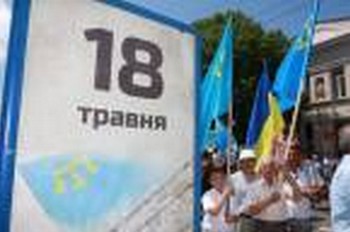Even as EU pressure mounts, lies and denial mark the Ukrainian government’s approach to the plight of the Crimean Tatars.
The old lie about supposed Crimean Tatar collaboration with the Nazis, used as Joseph Stalin’s excuse for deporting nearly 200,000 of them in 1944, has recently appeared in a book published with Crimean local authority funding. Since the Soviet regime itself acknowledged back in 1967 that the allegations were unfounded, the motives of all those rehashing the lie must be questioned.
So too must the motives of Ukraine’s president, Viktor Yanukovych, who in 2011 appointed as prime minister of the Crimean region Anatoly Mohylyov. Previously, as chief of the Crimean police, Mohylyov was brutal in dealing with Tatar protesters and squatters, who represent a minority on the largely Russian-speaking peninsula. He once wrote that the Tatars were the agents of a “Western civilization” perturbed by “Slavonic brotherhood” and intent on sowing discord.
by Halya Coynash*
This year, local authorities tried to ban an annual commemoration of the deportation in May, and Mohylyov has refused to work with the Mejlis, the Crimean Tatars’ legally recognized executive body.
Meanwhile, the roughly 260,000 Tatars who live on or near the peninsula, most of them returnees or their descendants, struggle with issues of education, poverty, discrimination, and a lack of political representation.
The authorities’ standard denial of these ills took on new dimensions last month when Ukraine’s foreign minister effectively denied the existence of problems not just experienced by the Crimean Tatars but documented in detail by major European structures.
It is impossible not to share the frustration expressed by Natalya Belitser from the Pylyp Orlyk Institute of Democracy during an address given in Simferopol, the Crimean capital, early this month. She focused on the Crimean Tatar issue in the context of Ukraine’s European integration, the importance of which seems to be understood by all barring those holding high office in Ukraine.
The issue was not among the 11 priority areas on a list drawn up by Stefan Fuele, the EU’s enlargement commissioner. That list, later shortened, was of key commitments that Ukraine had to fulfill or have made significant steps toward fulfilling for the EU-Ukraine political association and free-trade agreement to be signed at the end of November.
But the absence of an issue from this list does not mean that it doesn’t exist. Indeed Fuele’s address at the Conference on the Rights of Crimean Tatars in September made the EU’s recognition of its importance abundantly clear. The commissioner highlighted some key issues needing reflection, namely: the legal aspects of return for formerly deported Crimean Tatars returning to their homeland; the status of land, housing, and property; political participation; socio-economic aspects of return and integration; language, culture and religion; and education. His address was largely based on the conclusions and recommendations of a vital report commissioned by the OSCE High Commissioner for National Minorities.
With European integration very much on the agenda, it is immensely regrettable that Ukraine’s foreign minister, Leonid Kozhara, and Mohylyov created the impression that Ukraine’s leaders are living in some kind of parallel universe. Following the September conference, Kozhara stated that the government was not planning to use the OSCE report and that the Crimean Tatars face no discrimination but enjoy the same rights as other citizens of Ukraine. So that’s that then.
Or not quite the end of the story, and not just because stubborn denial will not make the problems faced by the Crimean Tatars go away. According to Belitser, during the September conference, “the foreign minister saw fit to ignore the presence of representatives of the Office of the High Commissioner on National Minorities – its director, Ilse Brand-Kekhris; senior legal adviser Vincent de Graaf and senior political adviser Bob Dean.” She suggests that this extraordinary behavior must make European and international representatives doubt the Ukrainian leadership’s stated commitment to observing European standards on the rights of minorities.
Such doubts are felt by Crimean Tatars and those closely following the situation in the Crimea. The problems identified in the above-mentioned reports and others, such as last year’s monitoring report by the European Commission against Racism and Intolerance and U.S. State Department’s most recent human rights report on Ukraine, are long-standing, and the current regime is not the first to fail to address them properly.
There have, however, been a number of worrying developments over the last three years, including the inflammatory textbook and Yanukovych’s appointment of Mohylyov. Few analysts believe that Mohylyov’s confrontational approach and efforts to undermine the Mejlis do not have the president’s support. People from extremely marginal groups have been placed in positions previously held by members of the Mejlis, seemingly on the basis of their likely loyalty to those in power.
It is worth remembering one warning from the OSCE report that Ukraine’s government has chosen to dismiss:
“Crimea faces a volatile mixture of acrimonious political competition, socio-economic exclusion, inter- and intra-religious strife, and a general atmosphere of increasing intolerance. The risk of inter-ethnic violence is real and requires urgent attention, both from Ukraine and from its international partners.”
A policy of denial is always doomed to failure. When accompanied by ill-considered and provocative actions, and astounding disregard for offers of assistance, it is also dangerous.
* Halya Coynash is a journalist and member of the Kharkiv Human Rights Group.
Picture: A sign held aloft during a commemoration marks the date, 18 May, that the Crimean Tatars were deported in 1944.
Transitions (TOL) is a nonprofit organization established to strengthen the professionalism, independence and impact of the news media in the post-communist countries of Europe and the former Soviet Union. We do this through a combination of journalism and media training programs, and the publication of Transitions Online magazine.
See:
http://www.tol.org/client/article/24000-on-crimea-kyivs-parallel-universe.html










